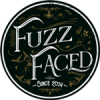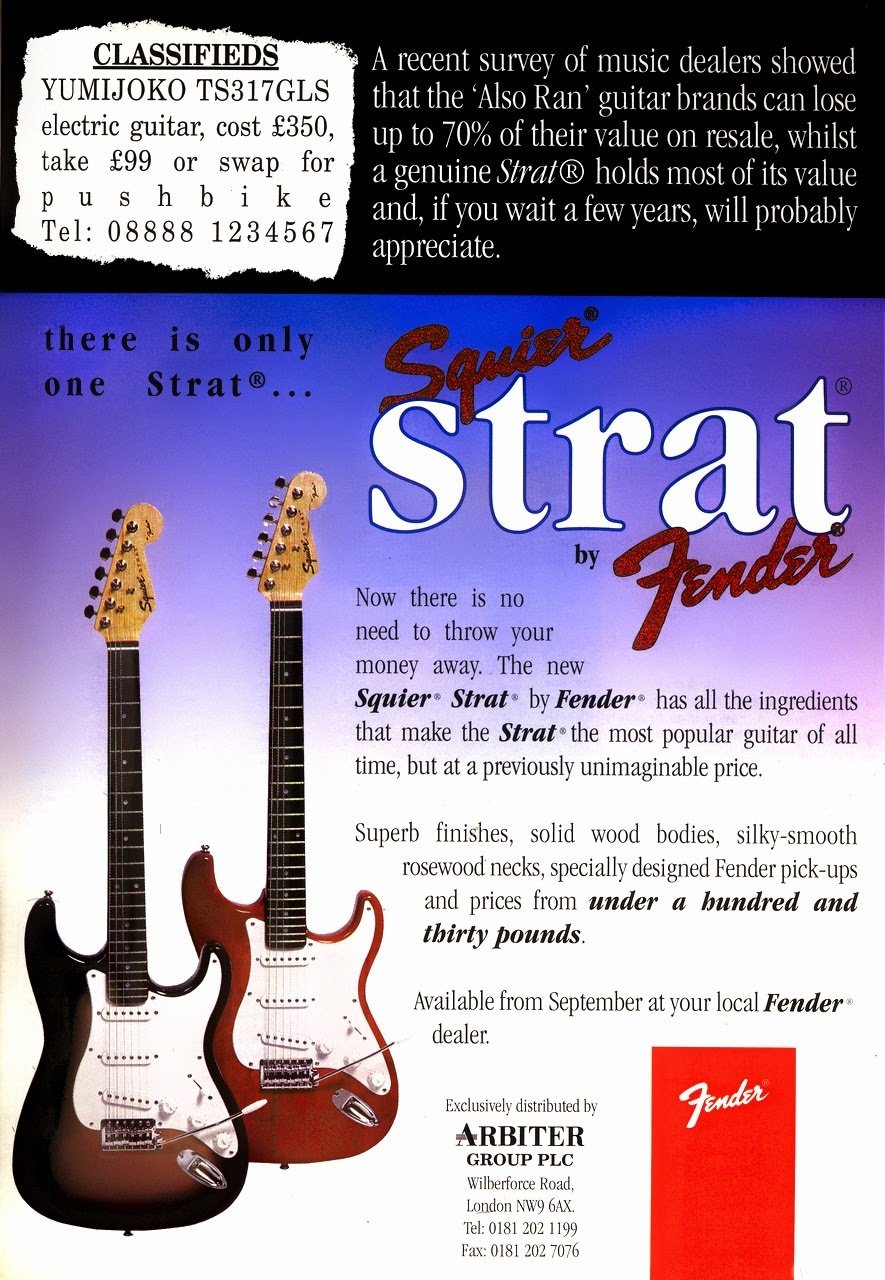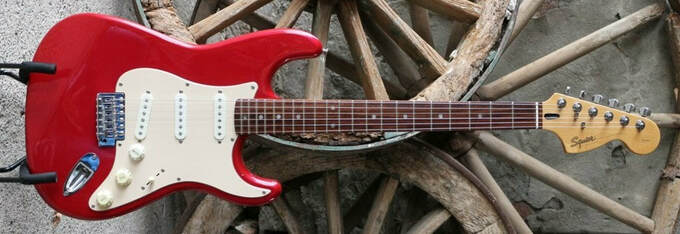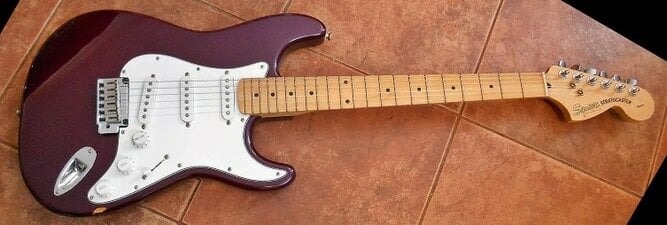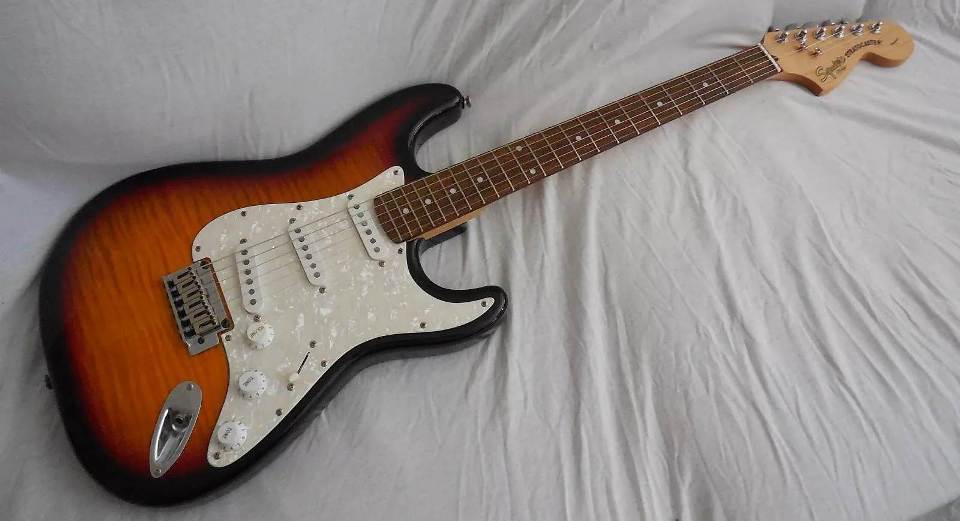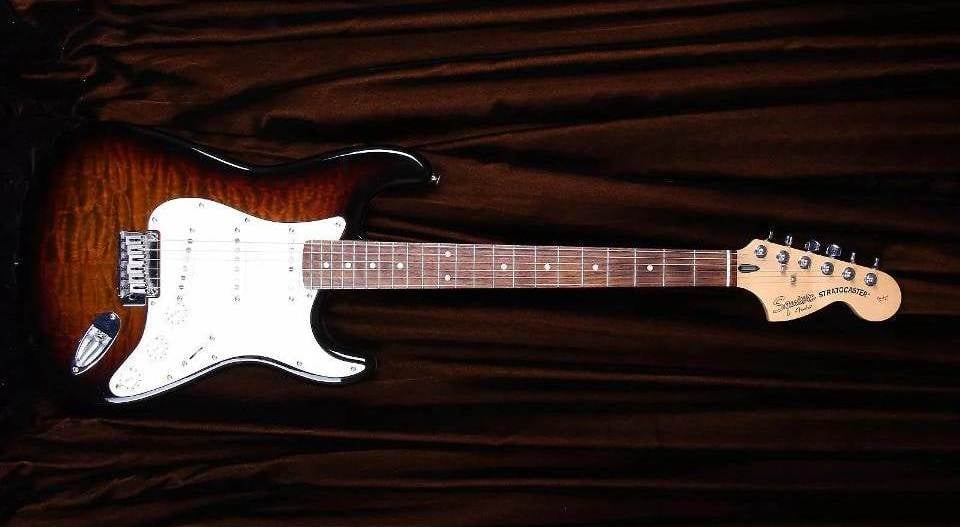Squier STANDARD SERIES
The Standard Series, which in 1998 had been relegated to Mexico for about ten months after the Korean experience, returned to the East with the Squier Standard Stratocaster, Squier Standard Fat Stratocaster, and Squier Standard Double Fat Strat models. This series could be considered a step higher than the Affinity. The Standards were all characterized by a thicker (45mm against the 40mm of the new Affinities of 1999) "solid hardwood" body (probably agathis and in some cases alder) and, a big headstock with the Squier Gold Logo and die-cast tuning machines, twenty-one frets and Synchronous Tremolo with six screws.
This series could be considered a step higher than the Affinity. The Standards were all characterized by a thicker (45mm against the 40mm of the new Affinity Strats of 1999) “solid hardwood” body (probably agathis and in some cases alder) and, a big headstock with the Squier Gold Logo and die-cast tuning machines, twenty-one frets and Synchronous Tremolo with six screws.
These guitars were all unveiled at the 1999 NAMM.
The new Standard Squiers with rosewood fretboards made in China in the Yako plant had a serial number that started with “CY” (China Yako), and those made in Dallan Dong Fang that started with “CD” (China Dallan). The models with maple fretboards were manufactured in Indonesia in the PT Cort plant and had the serial number starting with “IC” (Indonesia Cort).
This series could be considered a step higher than the Affinity. The Standards were all characterized by a thicker (45mm against the 40mm of the new Affinity Strats of 1999) “solid hardwood” body (probably agathis and in some cases alder) and, a big headstock with the Squier Gold Logo and die-cast tuning machines, twenty-one frets and Synchronous Tremolo with six screws.
These guitars were all unveiled at the 1999 NAMM.
The new Standard Squiers with rosewood fretboards made in China in the Yako plant had a serial number that started with “CY” (China Yako), and those made in Dallan Dong Fang that started with “CD” (China Dallan). The models with maple fretboards were manufactured in Indonesia in the PT Cort plant and had the serial number starting with “IC” (Indonesia Cort).
In May 2000, both the Affinity and Standard series were renewed with the addition of new finishes and with the introduction of a thinner neck, called “fast action”.
The new Squier Standard Stratocasters had featured a twenty-two-fret fingerboard, as opposed to the Affinity Strats which had 21 frets. Furthermore, they were improved with a Synchronous Twin-Pivot Tremolo bridge and new pickups in alnico, whilst Affinity Strats kept the ceramic pickups.
The large headstock decal was redesigned with the word "STRATOCASTER" in back lettering, curved and bold like that of the CBS Stratocasters.
The body was made of agathis, but alder was used for a few special models and Cherry Sunburst Standard Stratocasters.
In mid-2018, the Indian laurel fretboard took the place of that made of rosewood due to new CITES regulations on the use of this wood.
The new Squier Standard Stratocasters had featured a twenty-two-fret fingerboard, as opposed to the Affinity Strats which had 21 frets. Furthermore, they were improved with a Synchronous Twin-Pivot Tremolo bridge and new pickups in alnico, whilst Affinity Strats kept the ceramic pickups.
The large headstock decal was redesigned with the word "STRATOCASTER" in back lettering, curved and bold like that of the CBS Stratocasters.
The body was made of agathis, but alder was used for a few special models and Cherry Sunburst Standard Stratocasters.
In mid-2018, the Indian laurel fretboard took the place of that made of rosewood due to new CITES regulations on the use of this wood.
These "basic" series over time was extended with other models: the Standard included the Squier Standard Strat-7 Seven String Stratocaster (available in the HSS and in the hard-tail HH versions) in the 2000 catalog.
In 2004, the Squier Black & Chrome Standard Stratocaster debuted and the following year, the "fat" version was added. The big headstock, the body, and the pickup covers of these guitars were black, the knobs and the pickguards chrome-plated and for the fretboards, a very dark rosewood was used. These details were designed to attract the younger players who approached the six-string playing heavy metal. As Justin Norvell, Squier's marketing manager at the time, recalls: “Younger players mostly play aggressive music. [...] These guitars are for heavy guys.”
SQUIER DELUXE SERIES
Squier Deluxe Series was born in 2004 to create a higher level under the Squier brand. The first Squier Deluxe Stratocaster had an alder body, available in the 3-Color Sunburst with flame maple top (made in Indonesia) and Antique Burst with quilt maple top (made in China) finishes, and mounted staggered poles alnico pickups.
It was born as a limited edition, but its success was such that its production lasted four years. It should not be confused with the more recent Squier Standard Strat FMT (Standard Series) with an agathis body and flame maple top.
Deluxe Series includes also other instruments, such as the Squier Deluxe Hot Rails Strat, born in Indonesia in 2007, with a basswood body and three Duncan Designed HR-101 Hot Rails pickups, "for full sound and near-endless sustain", as the catalog stated, the Squier Trans Satin Stratocaster, with basswood body, and the Squier Satin Trans Fat Stratocaster and Squier Satin Trans Fat Stratocaster HH, both with mahogany body and satin or transparent finishes.
It was born as a limited edition, but its success was such that its production lasted four years. It should not be confused with the more recent Squier Standard Strat FMT (Standard Series) with an agathis body and flame maple top.
Deluxe Series includes also other instruments, such as the Squier Deluxe Hot Rails Strat, born in Indonesia in 2007, with a basswood body and three Duncan Designed HR-101 Hot Rails pickups, "for full sound and near-endless sustain", as the catalog stated, the Squier Trans Satin Stratocaster, with basswood body, and the Squier Satin Trans Fat Stratocaster and Squier Satin Trans Fat Stratocaster HH, both with mahogany body and satin or transparent finishes.
Antonio Calvosa
